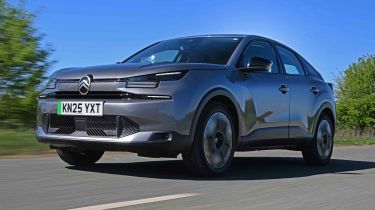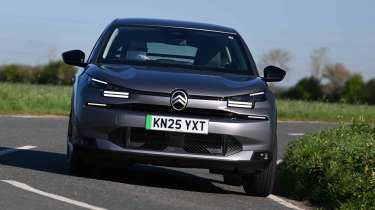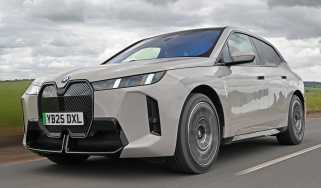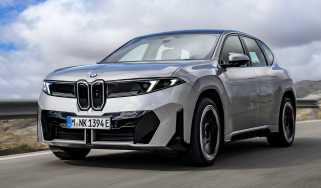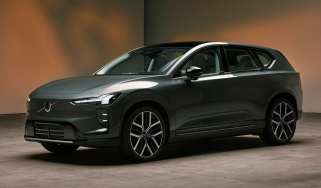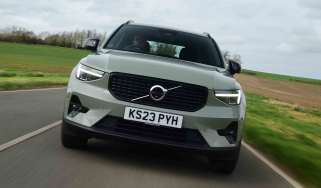Citroen e-C4 review
The all-electric Citroen e-C4 family crossover offers decent space and tech for a great price

Our opinion on the Citroen e-C4
If you’re looking for a five-seat electric family car that won’t break the bank, then the Citroen e-C4 is a canny choice in a competitive market. It has plenty of room for passengers and luggage, while the soft seats and suspension mean that it delivers great comfort. The recent facelift didn’t make any drastic changes beyond the revised front end, but prices have been cut by a significant amount to make the e-C4’s shortcomings in some areas (a relatively short driving range compared with newer rivals, some older on-board tech, and poor efficiency at higher speeds) even easier to overlook.
About the Citroen e-C4
Ever since the original model arrived in 2004, the Citroen C4 has ploughed its own furrow in the family car sector. While the first and second generations were relatively conventional hatchbacks (albeit with some funky elements, such as a fixed-hub steering wheel on the Mk1), the latest Mk3 introduced in 2020 carved its own niche as a five-door crossover SUV. The high-riding hatchback initially came with petrol, diesel and, for the first time, all-electric powertrains, while a facelift at the end of 2024 revised the line-up to comprise petrol, hybrid and electric drive.
Updates to the C4 focus on the front and rear, with a refreshed nose that wears the latest corporate look, while the tail-lights have been revised with new block LED elements across the tailgate. Inside, there’s a new steering wheel, and all cars now come with a 10-inch infotainment screen and driver’s display, while plusher seats are the main highlight of the revisions. The EV variant is marketed as the e-C4, in line with Citroen using the e-prefix on all of its electric cars.
Citroen e-C4 X pricing and latest deals
Citroen was the first manufacturer to react to the Government's new Electric Car Grant (ECG) announced in July 2025, and the e-C4 is one of six Citroen models eligible for the £1,500 grant. You can find the latest top deals on electric cars through the Auto Express marketplace, and our sister brand Carwow has a live EV deals page tracking the latest offers.
Used - available now
If you're interested in getting yourself a Citroen e-C4, we can help. Configure your ideal Citroen e-C4 now to get top offers from local dealers, check out the latest Citroen e-C4 leasing deals or search for used Citroen e-C4 models with our Find A Car service. You can even sell your existing car for a great price with Auto Express Sell My Car.
Performance & driving experience
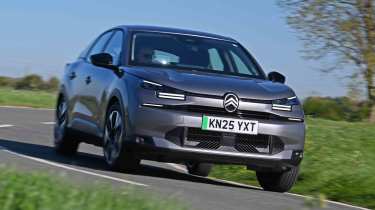
| Pros |
|
| Cons |
|
Citroen has turned back the clock in recent years, so rather than trying to compete with rivals for sporty handling, its line-up now focuses on the sort of comfort that previous models such as the DS and CX were revered for. While hydropneumatic suspension is too complex and expensive to fit to any of its cars these days, Citroen offers its Advanced Comfort tech instead, which introduces hydraulic bump stops that are designed to boost the cushioning effect of a car’s dampers.
On the e-C4, there are double hydraulic stops at each corner up front, and single stops on the rear, and this goes a long way to boosting comfort. Another bonus is the battery, because the extra 250kg or so it adds when compared with the petrol auto C4 helps to smooth off the ride.
The suspension set-up is conventional, with MacPherson struts up front and a torsion beam at the rear, while all cars are fitted with 18-inch alloy wheels.
Performance, 0-60mph acceleration and top speed
There are two electric motor options that produce 134bhp and 154bhp, respectively, while maximum torque is rated at 260Nm for both motors. There are three drive modes offered – Eco, Normal and Sport – and in the first two settings, maximum power is only available if you press the accelerator beyond a step in the pedal travel, much as you would to engage kickdown in an automatic gearbox. Front-wheel drive is the only configuration available, and there are 0-62mph times of 10.0 and 9.3 seconds for each model. Top speed is limited to 93mph across the range.
| Model | Power | 0-62mph | Top speed |
| You! 50kWh | 134bhp | 10.0s | 93mph |
| Max 54kWh | 154bhp | 9.2s | 93mph |
Town driving, visibility and parking
It’s in the urban cut and thrust that the Citroen e-C4 really does its best, thanks to its punchy power delivery off the line. The car defaults to the Normal drive mode, and in our experience, you’ll probably never switch out of it – Sport mode delivers a snappy throttle response that takes a bit of getting used to, while Eco restricts the car’s power so much that you find yourself pressing the accelerator harder to make up for it.
Light steering means low-speed manoeuvres are a breeze, while the soft suspension soaks up bumps well, with only the biggest potholes sending shudders through the cabin.
B-road driving and handling
The soft ride does wonders for comfort, but it comes at the expense of handling ability. There’s nothing wrong with the e-C4; it’s pretty competent, and body control is decent, but the softer edge to the suspension means it wallows a little, so you’re less inclined to attack a series of bends as you would in many other cars. The light steering doesn’t weigh up at higher speeds, which limits driving enjoyment further, but then if you’re taking a more laid-back approach, this doesn’t really cause issues.
Motorway driving and long-distance comfort
At higher speeds, the e-C4 is quiet and refined, thanks to the slippery shape cutting through the air without generating much wind noise. While some Citroens now come with paddles that adjust the amount of regenerative braking, the e-C4 still has a ‘B’ mode that’s selected via a button next to the drive selector. We’d avoid this mode on the motorway, because it can make for a jerky drive when lifting off the throttle – it’s a set-up better suited to urban use.
“The drive modes, which are selected via a rocker switch next to the drive selector on the centre console, seem a bit superfluous. The system defaults to Normal, so you stick with that most of the time. Eco mode cuts the power, so it feels as if you need to work harder to maintain the same speed, while Power mode adds a twitchy throttle that seems at odds with the e-C4’s character.” – Dean Gibson, senior test editor
Range, charging & running costs
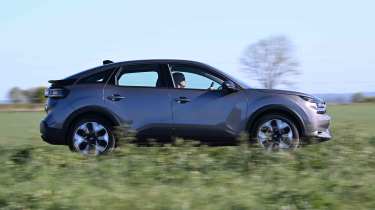
| Pros |
|
| Cons |
|
With a choice of 50kWh or 54kWh batteries, there isn’t much variety in the e-C4 line-up, but the smaller battery sizes help to keep list prices down. Kicking off from around £26,000, the e-C4 even undercuts smaller electric superminis such as the platform-sharing Peugeot E-208.
Electric range, battery life and charge time
Citroen quotes a range of 219 miles for the 50kWh model and 257 miles for the 54kWh car, which are relatively modest figures when compared with rivals such as the Volkswagen ID.3 – the lowest-spec version of that car with a 52kWh battery has a claimed range of up to 241 miles.
During our time with the e-C4 with the 50kWh battery, we saw an efficiency of 3.6 miles per kWh over a range of roads, but with a large proportion of motorway use. This is where the e-C4 is arguably at its worst, because efficiency tends to deteriorate once you’re above 50mph. Citroen quotes a city driving range of 295 miles for the smaller battery around town, and if you keep your speeds below 40mph, you should reap the benefits.
For comparison, when we tried the 54 kWh battery model, we saw an average of 5mi/kWh with minimal motorway use, which translates into a range of 270 miles. This is still 77 miles short of the official City range (347 miles), but shows how driving at higher speeds impacts the e-C4’s range.
Another way to improve the efficiency of the e-C4 is to get the optional heat pump. This energy-efficient device reduces the demand on the battery when heating the interior in cold weather, helping to preserve your overall driving range.
Charging speeds are slower than those of most rivals, with a 100kW maximum allowing a DC charging source to top up the battery from 20-80 per cent in half an hour (both battery packs quote the same figure). If you’re more likely to take advantage of a cheaper electricity tariff and charge up at home, a dedicated 7.4kWh wallbox charger takes seven and a half hours, or more than 24 hours via a three-pin plug. You can specify an 11kW charger for quicker AC charging, but since this requires a three-phase electricity supply and few UK homes have this, we don't see this as being vitally important.
| Battery size | Range | Insurance group |
| 50kWh | 219 miles | 21 |
| 54kWh | 257 miles | 23 |
Insurance groups
The three versions of the e-C4 rank in insurance groups 21, 22 and 23. In comparison, the C4 petrol sits in groups 16-19, but the Hybrid model matches the top-spec e-C4, in group 23. These group ratings are on a par with similarly priced rivals.
Tax
Electric cars no longer benefit from free road tax, and are subject to vehicle excise duty (VED) at the same rate as combustion-engined models. But because the e-C4 is so affordable, it doesn’t incur the luxury car tax on models that cost more than £50k (raised from £40,000, and comes into effect from 1 April 2026, although it applies retrospectively to cars registered from 1 April 2025).
One area where the e-C4 could be attractive is as a company car. It faces the same three per cent Benefit-in-Kind rate as every other EV on the market, but low P11D prices mean annual tax liabilities will be cheaper than they are for similarly sized models. It presently attracts a three per cent rate, but this will rise to four per cent for the ‘26 to ’27 tax year, and five per cent from ‘27 to ‘28.
EVs would also be subject to an eVED pay-per-mile fee if that comes into force from April 2028 onwards.
Depreciation
One area where the e-C4 takes a pounding is in terms of resale values. Our experts at CDL estimate that the e-C4 will be worth 33 per cent of its list price after three years and 36,000 miles. In comparison, the entry-level Volkswagen ID.3 retains 48 per cent of its value after the same period.
Interestingly, the booted Citreon e-C4 X is expected to retain around 39 per cent of its original value - not a stellar increase, but significant nonetheless.
To get an accurate valuation for a specific model, check out our free car valuation tool...
Interior, design & technology
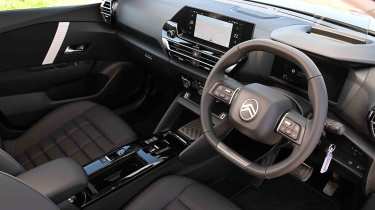
| Pros |
|
| Cons |
|
From the outside, the updates to the Citroen e-C4 are subtle, with a revised front end that brings it into line with the latest Citroen C3 and Citroen C3 Aircross, plus a revised rear end that has a simplified light strip across the tail.
Not a lot has changed in the cabin, apart from a new steering wheel with the latest Citroen logo, a 10-inch touchscreen for all models in the line-up and a new seven-inch driver’s display for Plus and Max trims.
Interior and dashboard design
The layout is fairly conventional, and the physical controls for the climate functions – consisting of three rotary dials and a selection of buttons – have been carried over from the pre-facelift car. The upright touchscreen is angled towards the driver slightly, while the gloss black surround and metal-effect air vent trim below distract from the use of harder plastics elsewhere.
Materials and build quality
The cabin is reasonably well built, and the use of harder plastics should mean that it withstands the knocks of family life. The soft seats are finished in fabric and synthetic leather across the range, while Alcantara-effect upholstery is offered as an option on the top-spec Max model.
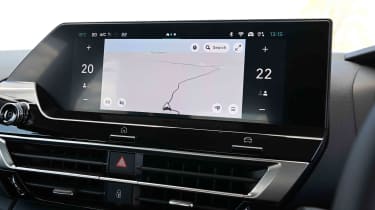
Infotainment, sat-nav and stereo
There’s a 10-inch touchscreen for all models in the e-C4 line-up, but the base You! trim does without the more advanced My Citroen Drive Plus set-up that adds navigation, voice control and connected services. The system has large on-screen buttons, but we found they needed a couple of presses to activate, which can be distracting. At least there are physical home and car set-up buttons, allowing you to navigate to selected screens quickly. Having a physical volume control is also handy, while the controls on the steering wheel are easy to use, too. Wireless smartphone connectivity is standard on all cars, but only the Max has the option of wireless phone charging, which comes as part of the £500 Techno Pack.
“One area where the e-C4 is showing its age is with its USB sockets. There are only three in the cabin, with two up front and one for back-seat passengers, with a single USB-C connection on the dashboard that’s good for transferring data from your smartphone.” – Dean Gibson, senior test editor
Boot space & practicality
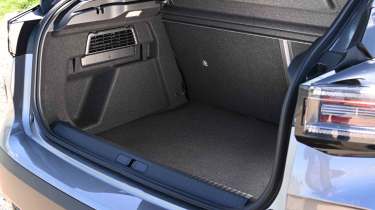
| Pros |
|
| Cons |
|
While the Citroen e-C4 is based on a platform that’s shared with superminis, the car’s long body and crossover shape create more space inside than many similarly priced models. If you need a family EV but don’t want to break the bank, then it’s a decent choice.
Dimensions and size
The e-C4’s shape puts it between classes, somewhere between a hatchback and an SUV. It’s roughly the same width as a Volkswagen ID.3 and has a shorter wheelbase, but it’s longer and lower.
| Dimensions comparison | |||
| Model | Citroen e-C4 | VW ID.3 | Skoda Elroq |
| Length | 4,355mm | 4,264mm | 4,488mm |
| Width | 1,834mm (2,032mm) | 1,809mm | 1,884mm (2,148mm inc mirrors) |
| Height | 1,520mm | 1,564mm | 1,625mm |
| Wheelbase | 2,670mm | 2,770mm | 2,765mm |
| Boot space | 380-1,250 litres | 385-1,267 litres | 470-1,580 litres |
Seats & passenger space
The extra cushioning that the Advanced Comfort seats offer helps to give the e-C4 an air of luxury because they are so comfortable. There’s a good range of wheel and seat adjustment, too, so most drivers will be able to set a good driving position. The starter button is slightly recessed behind the steering wheel next to the centre console, so it’s obscured by the wheel rim, but you soon become familiar with its position.
Storage is a mixed bag up front. There’s a modest armrest bin and twin cup-holders under a roll-top cover, while a lidded compartment sits ahead of the drive selector. It features a 12-volt socket, while the lid is a little flimsy. Above that is a slot for your phone – wireless charging can be added to the Max model as part of the £500 Techno Pack – with USB-A and USB-C sockets on either side. The glovebox is a little small courtesy of the fuse box located behind it, while a slide-out tray above it can be used to store a tablet device. Citroen offers a Smart Pad Support as an accessory so you can have an executive-style second screen for a fraction of the cost. The door bins are on the small side, with only just enough space to fit a drinks bottle and not much else.
Access to the rear is good because the doors open wide, while the room available in the back is fair. There’s not quite enough space to add a fold-down centre armrest, but there are still three seatbelts. The e-C4’s ICE roots show through in a transmission tunnel that limits foot space, while a step in the floor beneath the front seats also makes it awkward to rest your feet. At least headroom isn’t an issue beneath that sloping roof. The back door bins are smaller than the ones up front, but the seatback pockets feature a separate, smaller pocket that's ideal for smartphones. There are two air vents in the back, but just one USB-A connection.
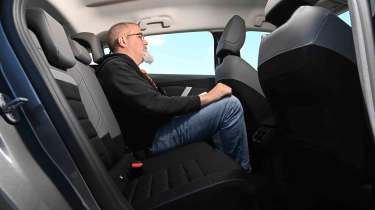
Boot space
There’s 380 litres of space in the back of the e-C4, with a wide, low floor in the luggage area. There’s no storage beneath, but the Max model gets a double-height floor and the seats fold easily in a 60:40 split and create a total capacity of 1,250 litres. When you consider how much the e-C4 costs, it offers more boot space than many other cars at the same price and should be practical in everyday use.
“One place where the e-C4’s roots as a combustion-engined vehicle are most obvious is beneath the boot carpet. Lift it up and you’ll find a circular recess for a spare wheel, but while the petrol C4 has a completely round indentation, the e-C4’s is squared off by the necessity to fit the battery in. Ironically, not even the petrol C4 has the option of a spare wheel – you’ll just have to rely on the tyre pressure warning system and standard repair kit to keep you going, if the worst should happen.” – Dean Gibson, senior test editor
Reliability & safety
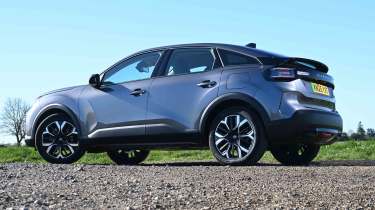
| Pros |
|
| Cons |
|
Electric powertrains should be less temperamental than combustion engines, thanks to having fewer moving parts. Plus, our Driver Power survey placed the Citroen C4 at the top of the pile in 2023, with owners praising the car’s comfort, reliability, economy and servicing costs. That being said, the Citroen brand has dropped a few places in the manufacturer rankings, going from 5th out of 32 manufacturers down to 16th out of 31 brands in the 2025 results. The puts it ahead of VW (27th), BYD (30th, and MG (last place), but behind Skoda (12th) and Renault (sixth).
When Euro NCAP tested the petrol C4 in 2021, it gave the car a four-star score, with a low rating for the safety systems and impact prevention electronics. This rating applies to the e-C4, too, and it’s worth noting that only the top-spec Max model features the more advanced Safety Pack Plus, which includes a radar sensor to help brake assist work at night and is able to detect cyclists – the standard system just relies on a camera, so it isn’t quite as effective.
| Euro NCAP safety ratings | |
| Euro NCAP safety rating | 4 out of 5 stars (Citroen C4, 2021) |
| Adult occupant protection | 80% |
| Child occupant protection | 83% |
| Vulnerable road user protection | 57% |
| Safety assist | 63% |
Buying and owning
Best buy: Citroen e-C4 54kWh Max
Lower list prices make it easier to recommend the top-spec Max model with the big battery just to give you that extra few miles between charges. However, if you have access to a chargepoint, then the Plus version offers decent value in terms of standard kit.
The e-C4 features Citroen’s standard three-year/60,000-mile warranty, with the option to extend this up to five years or 100,000 miles at extra cost. In addition, the e-C4 has an eight-year/100,000-mile warranty for its drive battery that guarantees it will maintain 70 per cent of its capacity.
As for servicing, the e-C4 has intervals of 24 months or 16,000 miles, whichever comes first. Citroen offers its electric range of cars with a cheaper servicing plan than its regular petrol equivalents, due to less work required to maintain an EV.
Citroen e-C4 alternatives
With its crossover/hatchback body, there aren’t any real rivals for the e-C4, especially at its price point. The closest car to it shape-wise is the Peugeot E-408, but with a bigger battery and prices in excess of £40k, it’s not really a rival. You’re better off looking at cars such as the Peugeot E-308 and Vauxhall Astra Electric, which use similar tech but are also more expensive. The Peugeot E-2008 offers much the same space in a more SUV-like body. Beyond the Stellantis group, the entry-level Volkswagen ID.3 overlaps the top end of the e-C4 range, while the MG4, Ford Puma Gen-E and entry-level versions of the Skoda Elroq are all within a similar price bracket.
Key updates of the Citroen e-C4 review
8 January 2026: Updated the tax section with the increased £50,000 expensive car surcharge limit and included a mention about the proposed pay-per-mile scheme for EVs.
Deals on the Citroen e-C4 and alternatives
Citroen e-C4 Sense Plus: long term test
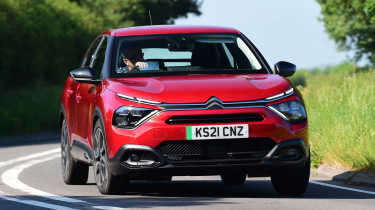
Former Editor-at-large, John McIlroy, ran a pre-facelift Citroen e-C4 in Sense Plus trim for six months in 2022 as part of the Auto Express long-term fleet. John found the 134bhp electric motor to be more than up to the task of getting the e-C4 up to speed, even when fully laden.
The battery range coped well enough with the school run and the odd trip to the office when things reopened after lockdown. He would have liked the car to be more efficient on the motorway, though. On the whole, the e-C4 was big enough for day trips into London, but John did note that anyone with a larger pushchair might struggle to fit that into the Citroen's boot. You can read the full long-term test here…
Citroen e-C4 pictures
Frequently Asked Questions
If you want a five-seat electric family car that has plenty of space and offers decent value for money, then there’s a lot to like about the e-C4. It majors on comfort, so it will be relaxing to drive.

